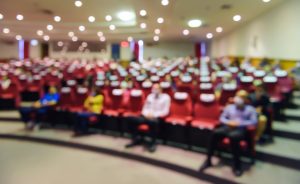MeetingMentor Magazine
What You Need to Know to Provide a Safe, Healthy In-Person Meeting

ConferenceDirect has recently launched a new service — health and safety consulting for meetings and events. We recently caught up with Mary Sanchez-Quigg, Vice President, Global Accounts with ConferenceDirect, who is on the team for this new service and has already been in charge of creating safe in-person meetings for ConferenceDirect’s Annual Partner Meeting last fall, as well as several recent client meetings — one of which attracted in excess of 4,000 in-person attendees. She also is on the ConferenceDirect marketing consulting and virtual specialist teams. Another little-known fact that makes her a natural for the job: Before joining ConferenceDirect, Sanchez-Quigg was a practicing nurse for 20 years.
“Show organizers have the responsibility to mitigate risk to the best of our ability for our attendees, our staff, and our supplier partners,” she said.
What are some of the key factors to consider when it comes to health and safety for in-person meetings?
Even before the pandemic, health and safety should have been among the first things you consider before you decide to host any event. Now, at least until the World Health Organization and/or the Centers for Disease Control and Prevention say we are no longer in a pandemic, we need to institute a duty of care to ensure that all stakeholders can attend the meeting in as safe a manner as possible in the midst of a pandemic.
You need to have the conversation with all stakeholders — internal staff and leadership, supplier partners, AV, DMC, transportation, the venue — everyone needs to be on the same page when it comes to keeping everyone safe. Even if you locked in the venue before COVID-19 happened, it’s not too late to have these conversations.

Mary Sanchez-Quigg, Vice President, Global Accounts with ConferenceDirect
Some things to consider:
• How conducive is the site to melding public and private groups? In a hotel, how will the property handle the confluence of transient guests who also will be on the property and using the same amenities with your attendees? How will a hotel or convention center handle the comingling of your group with other groups using the property?
• Will the physical meeting space be sufficient to accommodate the physical distancing you will need for your group? What happens if your pickup exceeds expectations — can your meeting space still accommodate your group without violating the six-foot rule?
• Will the expo space allow for one-way aisles to control crowd movement?
• Will it be possible to have demarcated one-way exits and entrances to the expo and meeting spaces?
• What health and safety protocols does the venue follow?
• What health and safety guidances are in place in your host destination? Keep in mind that these can, and likely will, change between when the event is contracted and when it is held.
• What testing and/or screening options are available?
• How will you move a large group of people from one area of a venue to another?
• Given the seasonality of your schedule and your host destination, can you hold some functions outdoors?
• How will the venue handle food and beverage functions? AV?
• What is the current state of the venue’s HVAC and ventilation?
• What health and safety training has the venue’s staff taken? Is there a staff policy in place? If so, what does it include?
In a perfect world, these factors would be taken into consideration prior to signing the hotel contract as part of your due diligence, but if you contracted your space pre-pandemic, you may need to revisit some of these items.
What resources should you utilize when planning an event during the pandemic?
I personally like the Johns Hopkins COVID-19 dashboard, and I also use the state and local jurisdiction’s health dashboards. Whatever resources you use, starting six or eight weeks prior to the meeting, look at the trends. For example, are the rates of positivity and hospitalizations in the area trending up or down, or are they flat? What are the rates of vaccination, both in the locality of the event and where your attendees will be coming from? Will your stakeholders be driving or flying to the event?
Various hotel chains and brands also have their own health and safety protocols, but I would have a deeper dive conversation with the CSM and the AV provider, for example, to find out what specifically they do to manage the program.
You need to follow the science.
What certifications are useful for planners to have?
I have taken the Pandemic Meeting & Event Design and the Pandemic Onsite Protocol, both available through Meeting Professionals International (MPI). The Events Industry Council also offers the Pandemic Compliance Advisor Course for meeting planning professionals.
What do you need to think about in terms of staffing the event?
You likely will want to have more staff on site now than in the past, even if for nothing more than to serve as ambassadors and help keep any queues physically distanced. Before, you might have had one staff for every four rooms to check AV, etc. Now you may need a staff person for each room to ensure people use one door for entrances and another for exits, and to make sure people don’t bottleneck once they enter the room and that the flow into and out of the session is continuous. You’ll also likely need someone to ensure that people adhere to the physical distancing protocols in the registration line.
Who should be in charge of policing adherence to health and safety protocols, including mask-wearing?
Ideally, everyone would be singing from the same song sheet. But most of the training I’ve been through has indicated that it’s best to have a third-party handle adherence so you don’t put your staff in an awkward position. Everyone on staff should be on board, but the compliance officer should have the final authority.
What do you do if someone refuses to comply?
I would give them three chances: one to ensure they are aware of the protocols, then a second to remind them if they forget. The third time, sorry, you need to leave. But do provide choices, such as providing the opportunity for that person to speak with a physician in person or via telehealth should they have a medical reason for not being able to wear a mask. You also could give them the option to watch remotely from their room, or refund their fee or credit it toward next year’s program if they cannot reach an accommodation or comply.
I also believe in having waivers and a code of conduct in place that people are required to sign at the time of registration. That way, you can reference the fact that they had agreed to comply with the code, including the health and safety protocols. And remind them repeatedly throughout the process, from registration confirmations, in written communications such as “know before you go” announcements, to day-of alerts on the apps and in the sessions.
Also, don’t forget to praise people for their adherence to the policies — we want them to have a good experience while on site!
What are your thoughts on requiring a “vaccine passport” or some other way to verify attendees have been vaccinated or have tested negative for COVID?
This gets a bit sticky. For example, how are you going to use and store that information? Because it’s personal health information, it needs to be securely stored and compliant with data rules, including the General Data Protection Regulation (GDPR) and other state regulations.
Also, though vaccinations are, in my opinion, the best way to get us all back to normal, they are not 100% effective. You can still come down with COVID, and it’s our job as the show organizer to keep the community as safe as possible. Testing also just gives you a snapshot in time. It’s still possible that the person who tests negative just hasn’t built up a sufficient viral load yet to test positive.
You have said that a communication plan is critical. What are some basics you should include in your communication plan?
Attendees need to have the information they need to make an informed decision about attending. Also, the more you can do to reinforce your policies ahead of time, the better.
Pre-conference, it’s important to spell out what the expectations are for attendees, staff, suppliers — everyone who will be on site. Let them know that your expectations are to host a program that will meet their learning and professional networking objectives in as safe a manner as possible. For example, let them know that they will be expected to wear face coverings except when actively eating and drinking. Will you practice a no-hugs, no-handshakes policy? What are the physical distancing, hand-washing, and sanitation protocols you will have in place? Let them know that they should not come into the meeting space if they don’t feel well.
Also let them know what your plan is for after the event. What will you do if someone does contract COVID on site? How will you communicate that to your stakeholders?
Spell it all out ahead of time in a code of conduct that everyone has to sign off on, then reinforce it at every opportunity before and during the meeting. They should know that these aren’t just arbitrary rules, that you have a goal these rules will help everyone accomplish — a safe, productive meeting.
How will all this affect your budget?
You have to expect that your profit margin won’t be as large as it was in January 2020, but you can still expect to have a profitable event.
Talk with your supplier partners. No one is in this to lose money. How can you partner to mitigate the expense? Have those tough conversations early and often.
Free Subscription to
MeetingMentor Online
"*" indicates required fields
About ConferenceDirect
About MeetingMentor